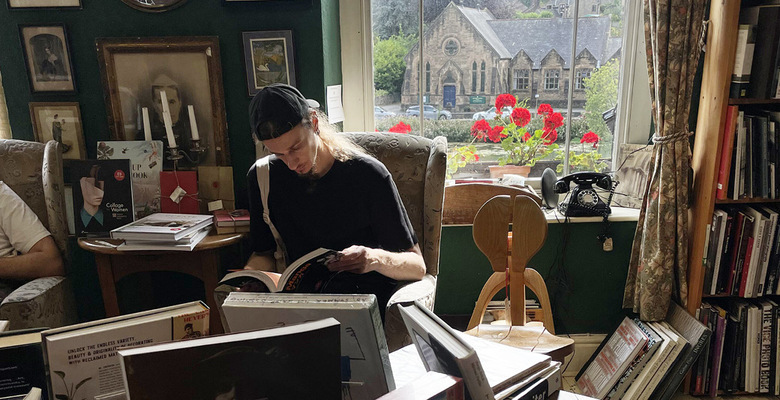
Sergey Zotov, the cultural anthropologist, science populariser, co-author of Suffering Middle Ages, creator of the Stradarium educational project, and Warwick University lecturer, tells his students about medieval alchemy, magic symbols, recipes for spells and fantastic beasts. Kommersant UK talked with the professor about the reasons why people study the Dark Ages, where to look for magic in Britain, and what interests people today in mysticism.
Tell us how you came to British academia. You began your studies at Saratov State University, followed by the Russian State University for the Humanities in Moscow, then you were off to the Autonomous University of Barcelona, after which you were at Warwick University and now you're a postdoc student at the Warburg Institute of the University of London. Can you tell us what led you to choose these universities?
After I’d finished my master's degree in Moscow I found a job in Germany. It was a research position in the Herzog August Library, an iconic landmark in the small German town of Wolfenbüttel, famous for its scientific achievements and all kinds of Renaissance collections and archives. I loved it in Germany, but the academic side of things was a little peculiar; the system is quite archaic and it's almost impossible to become a professor, especially if you're from abroad; it's even hard for the locals. They’ve only recently begun to fight this academic inequality. It seemed I had to move elsewhere and I settled on Britain. There’s a more conventional system here where Universities have been around since time immemorial. I got into British academia by first completing a PhD and then beginning to do my own research as a postdoc student. I chose Warwick University for pragmatic considerations; it offers many state-funded grants for foreign students. Additionally, Warwick is one of the top ten universities in Britain and is in the top hundred in the world. Alongside Oxford University, King's College London and other prestigious universities, it's in the Russell Group, a kind of British version of the Ivy League. This is good for an academic career, but the most important thing is their fantastic centre of research into the Renaissance, of which I am still an honorary member. On top of that, I also had friends who were studying and teaching students at Warwick themselves. Plus, Warwick is in the centre of the country, so it’s convenient for getting to the libraries of Oxford or driving to London and even Scotland or Wales are not too far away.

Aren't you afraid doing a PhD in this subject will leave you cloistered at University? How did the idea of sharing your knowledge with a wider audience come to you? I remember when the Suffering Middle Ages and Iconographical Mayhem communities first appeared; we humanity students loved them for their mixture of high-brow subjects with humour and their slightly illicit-seeming satirical use of religious symbols. But it turned out that the audience was far wider than just students; it reached almost everyone.
When talking to older enthusiasts of mediaeval history, you often hear about Ivanhoe, The Three Musketeers or the like, works which are not always directly related to the Middle Ages but are imbued with a certain historical atmosphere. By contrast, in my generation, the interest is more likely to have been kindled by playing computer games with mediaeval themes. At one point, Game of Thrones came out. I haven't even watched it, but many of my friends who had told me that the show’s popularity was a once-in-a-lifetime chance to reach a mass audience because of the heightened interest in the Middle Ages. As my friends and I were deeply involved in medieval history at that time, we created a book called The Suffering Middle Ages which became tremendously successful, even though the topics may seem a little obscure and many people might find it boring.
How can a successful book about history be written? In history, we have always been interested in phenomena we are experiencing in the present day. For instance, current trends in the study of history include things relevant right now, such as global and ecological history. It's the same in mass culture; at a certain point an interest in the Middle Ages came along and we’ve been making hay. It brought unexpected success for our book, which sold 200,000 copies in Russia alone. We managed to strike a nerve when there was a new burst of interest in that particular historical period.
I began to study history at a very young age, around 12 years old and for me, popularisation was one method of studying the subject. It's usually difficult for an expert in a particular field to talk about what they study to the general public because they're on a different plane. While you're still a student, you’re between these two states as you're still not a distinguished professor who has delved so deeply into their subject that they have forgotten its fundamentals. You are still a layperson who has stepped into the shallows of the subject and knows enough to explain things to your friends. Doing this helps you get a knack for explaining complex topics in simple language. Later on, when you begin to practice history more professionally, you can hone this skill further by continuing to teach about complex topics. Nowadays, the position of science communicator has even appeared at universities; journalists who explain articles from scientific journals such as Nature in human language.

How did this all grow into your educational project Stradarium?
My friends from The Suffering Middle Ages head Stradarium, they’re the ones who came up with those memes you mentioned. The project came about for two reasons. First of all, during the pandemic, it wasn't possible to go to live lectures in person. Secondly, after 2022, many people left Russia and the idea came about of creating a free online university with an unrestricted choice of topics. As well as strictly academic subjects, more experimental ones are included. This coalesced into a lecture hall where people from all over the world give and listen to lectures in Russian. I’ve already given courses on the visual history of magic, alchemy, icons, death and erotica. Right now I'm offering a course on the history of chimeric beings.
Have you had any falling-outs with the Russian authorities? Nowadays, it’s easy to be branded ‘offensive to religious feelings’ or blasphemous.
I left Russia in 2016, largely due to my concerns about freedom of speech, although also to develop my academic career. I had seen for myself the disruption and banning of various events, from concerts to exhibitions. I can't say that I was concerned for my life. I always believed that what I was doing was scientific analysis, and so less sensitive; it's one thing to deliberately make fun of something like a stand-up comic or meme creator, but it's quite another to show pictures which are already in the culture and explain what's happening in them. I took part in a book fair where I displayed some icons of Saint Christopher with a dog's head and I encountered a negative reception. But these icons were made in Rus* in the 16th century and it would be strange to expect a researcher to be quiet about some aspects of culture just because they don't match people's convictions. I used to think these arguments were trivial; some activists might feel aggrieved, but it didn’t affect science. In recent years, however, I’ve seen that it does. Of course, I'm glad that I don't need to fight these people in Britain.

Why should anyone bother studying the history of alchemy and magic in their free time? What kind of people sign up for your courses at university?
I don't just popularise the history of alchemy and magic, I also research this topic professionally. It's quite a niche field but it has been acquiring a certain popularity. Why is this? It would seem the question of technological development is coming to the fore in history once more: we dream of transhumanism, the idea that we might become immortal in some new form, not in heaven or purgatory, but as a hologram or recording on a flash card, so, as America was colonised, we will fly to Mars with Elon Musk. In the 1990s we saw an exceptional burst of progress and technological development and now we expect this pace of change to continue; we imagine there'll always be another great breakthrough and then another and another, so people have become interested in epochal shifts in world history. But what, for instance, did they think about technology in the 16th century?
In this view of history as a series of technological breakthroughs, alchemy and magic were doubtless parts of science in the Middle Ages and early modern period. In popular culture today, they may be taken to be something mystical and fantastic, in the spirit of Harry Potter and to a degree, this is how it was. But overall, they were part of the scientific worldviews of the time, especially alchemy. It was one of the leading theories of the time, as today are theories about dark matter, black holes and strings. An analogue is the alchemical theory of transmutation, which comes down to the idea that lead can be turned into gold. Was this theory correct? To a degree, it was, as in a nuclear reactor today, it's possible to transform lead into gold. Was it completely accurate? No, it was not, as today we know that by the methods used in the Middle Ages, it's impossible to turn lead into gold. Does this mean that, overall, alchemy was a waste of time and effort? Probably not, since it would follow that modern science would also be pointless if our theories turned out to be incorrect. If we don't test and research these theories, we will never run into anything novel or significant at all. Similarly, alchemists accidentally invented gunpowder, porcelain and a multitude of technologies and medicines that we still use today.
The great interest in medieval theories right now is because they have some truth in them. Additionally, it's interesting for us to try to understand the way of thinking about knowledge creation at that time. For instance, I'm currently mostly working on allegorical paintings. Even though they are somehow evocative of Harry Potter, with their wild beasts, monsters, dragons and mythical symbols, you could say that these pictures are the forebears of all modern scientific illustrations; all those diagrams and tables we see in physics textbooks. This is an excellent way to produce knowledge which is natural for us and clear for people to understand today. It's just in the Middle Ages, these techniques were still in their infancy, so it’s interesting and important to study them.
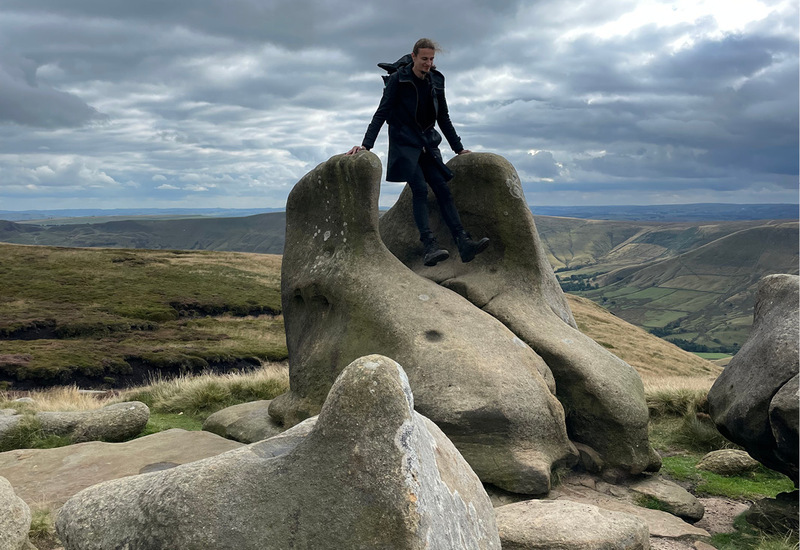
Does modern alchemy exist today? If so, what does it seek?
Modern alchemy does exist, even though alchemy as a discipline, or art or however it is called, has been repeatedly discredited in many different ways. A great many people really do practice it, by, for instance gathering together some typically medieval laboratory equipment and conducting experiments in the hope of finding and creating the philosopher's stone. On the other hand, there are people who professionally, as historians, reconstruct historical recipes using professional equipment such as Philips ovens. I have friends from Germany who conduct real alchemical experiments using modern equipment, not to get rich but to demonstrate what it's like. These experiments combine aspects of both history and chemistry. They have made a philosopher's stone, of course. They recreated it using historical recipes and powders found in the archives. This is another way of studying historical alchemy to understand how it actually worked and what exactly people were holding in their hands.
In what ways was the thought of medieval people unique and how is it similar to the thought processes of modern internet users? Why do you think people still cannot completely free themselves from magical thinking?
In Europe, medieval thought was completely centred around the Christian faith; it was absolutely all-pervading. Sometimes scientists say that we can see religious allusions in scientific practices or alchemy and magic but actually, this sounds a little naive. Medieval people’s entire worlds were entirely founded on a Christian belief system. It was quite idiosyncratic; in the Christian religion there is a beginning and end of the world, so people were constantly expecting the apocalypse. This led to various cases of mass hysteria when people thought that the end of the world was nigh, either because a particular scholar had named a date, or they had perpetrated some shocking event themselves or because some recent disaster had been attributed to the apocalypse. Medieval people believed that everything around them had been created by God, including some more negative things. As for the scientific worldview, this was an attempt to understand the workings of God through observation of nature, and through God, learn how some things in nature worked. So theology at the time was in some ways the queen of science, as mathematics and philosophy might be considered in our day. Knowledge of God trumped all the other sciences.
In this regard, people in modern times are not so different, in the West at least, as we're still living in a post-Christian culture and we are in a search for some kind of unifying, fundamental truth. For some, this may be proof of an ideological political or philosophical concept; for others, it may be a set of convictions formed by some impending catastrophe. Just as fear of the apocalypse constantly loomed over lives in the Middle Ages, we are preoccupied by the end of history, the twilight of globalism and global warming, which although undeniably real, also exist as modern mythologems. It may sometimes feel that we in the 21st century are quite different from people in the Middle Ages and we might mock their thinking, assuming we know it all now. Yet, in reality, we are not as dissimilar as we might think. We are still preoccupied by the very same questions which concerned people in the Middle Ages.
As for magic thinking, we should not forget that in Russia, religion was formally and informally banned for roughly 70 years. When, in the 1990s, this ban was finally lifted, attempts began to make up for what we had missed and a host of actors all appeared on the religious market all at once. As well as the traditional Orthodox Church and other religions, the public received a smorgasbord of esoterica as intriguing novelties. This gave rise to great demand for magical thinking from Wise Women to Kashpirovsky (a psychic healer popular in the late 80s). Modern technology was essentially intertwined with ancient magical practices. It would seem in the post-Soviet space, magical thinking may be explained as yet another attempt to make up for what we've missed; like when after covid, everybody eagerly threw themselves into travel and going to music festivals which had been impossible during the pandemic. Similarly, the post-Soviet person became an inexhaustible consumer of all kinds of outlandish-seeming magical and religious practices and this settled into the culture. Now a new generation has grown up, the children of those who became interested in magic and now that it’s permeated family life it will continue to be passed on.
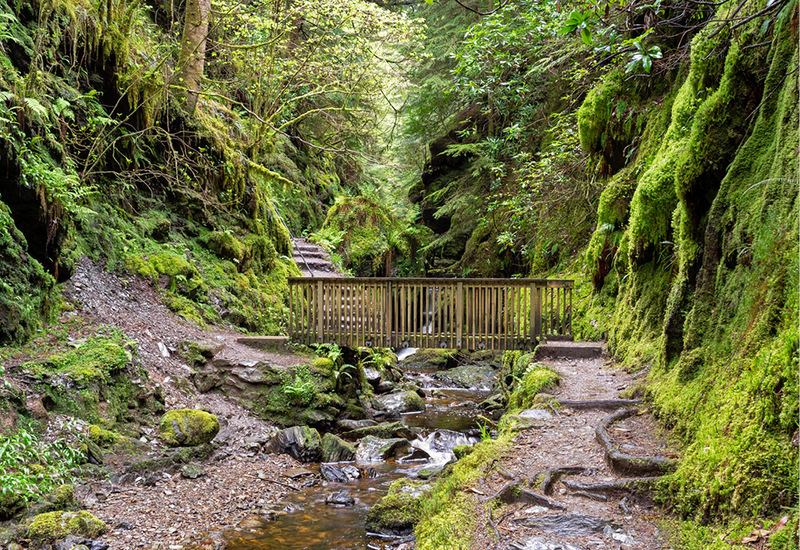
Where would you place the current moment on the historical spiral? Many for instance compare the 1990s with the Renaissance or the Enlightenment, but Umberto Eco predicted a new Middle Ages with the advent and the wide adoption of the internet. And what do we find now? Decentralisation, the pandemic; the middle class is disappearing. It looks like a dark age.
Political philosophers really have written a lot about a new Middle Ages after Umberto Echo, the main question is: what does ‘Middle Ages’ mean? On the one hand, we may regard the Middle Ages entirely negatively; the plague epidemic which devastated the population of Europe, the witch hunts, in which mostly innocent people died terrible deaths and the punishments and various other diverse religious persecutions of so-called heretics, all of which took place both in England and continental Europe. When we go to museums of the Middle Ages in any European city, Iron Maidens, and Spanish boots, devices used to torture people in unimaginable ways, are invariably on display and we can only recoil in horror and wonder how on earth people lived in those times. On the other hand, the Middle Ages were branded the ‘Dark Ages’ during the Renaissance, as it seemed to the people of that time that they were the best. Truly, in some parts of Renaissance Europe, there was economic growth and a flourishing of the arts, but the Middle Ages was a very lengthy and diverse period. It started roughly in the 5th century and finished approximately in the 15th century in Western Europe. In the peripheries, such as Eastern Europe, according to some theories, the Middle Ages persisted almost until the 18th century.
These thousand years, from the 5th century to the 15th, were not homogeneous. Witch hunts mainly did not occur during the Middle Ages but in the modern era and it's worth saying that most often witches were acquitted in court and not immediately sent off to be burnt at the stake. The plague raged in some countries but in others, it came only very slowly and its effects were extremely limited. There were a multitude of positive developments; there were renaissances during the Middle Ages, such as the Carolingian Renaissance, a burst of interest in sciences and rapid development of international trade. You must not forget that in the Middle Ages, a great many wonderful things were invented. For instance, it was at this time that Christian, Arab and Jewish cultures met and people began to understand and translate each other and a profusion of works of art were created. The well-known Gothic style is also a creation of the Middle Ages. We can imagine this period entirely positively. We might say that the Holy Roman Empire, a large state which existed in Europe in the Middle Ages, was a forefather of the European Union. People came together and united and they had elected princes which is similar to the work of modern political structures inside the European Union.
This is why when we talk about a new Middle Ages, it’s a metaphor and you have to understand what he meant; whether we’ll have plagues, endless wars and religio-ideological conflicts, or will there be a series of renaissances, the onset of rapid international collaboration bringing prosperity for all countries taking part, cultural exchange, a resurgence of scientific curiosity and sponsorship of the sciences and arts? Everything is in the eye of the beholder. Of course, today when people talk about the Middle Ages in the political sense they mostly mean a regression to something bad. So it follows that the term is just being used as a metaphor, without much meaning. We could call what's happening by any other name. This idea has nothing whatsoever to do with the real Middle Ages, of course.
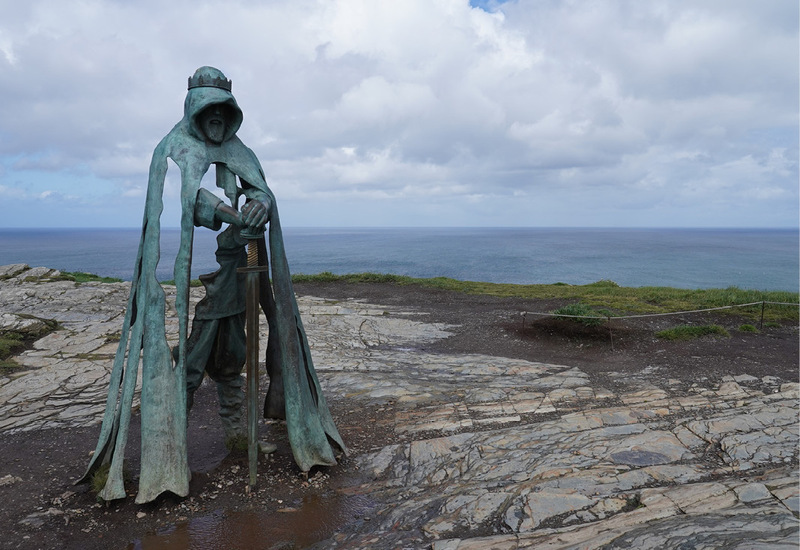
What makes the Middle Ages in Britain stand out?
That's an endless topic, of course, but the main peculiarity of Britain is that it was formed by a mixture of wildly contrasting cultures. There is an ancient Roman influence which is very strong and noticeable, especially in the language, the influence of French culture, and then Vikings came along; if we take the Scots language we can see how many words it contains which modern Danes would understand. The cultures of other Germanic peoples were present, such as the Angles and Saxons. The mixture of all these cultures is a unique situation; in many European countries the domination of one culture alone occurred and the other indigenous cultures gradually died out. For instance, Celts once lived in what is now Spain and where is that wonderful Celtic culture on the Iberian peninsula? It has been absolutely wiped out; all those intricate and ornate artefacts can only be found in museums. But in England, Scotland, Northern Ireland, Wales, on the Isle of Man and in Cornwall, (which was a separate polity politically and linguistically), all this has remained. Consequently in Britain, we see a unique situation in which an equilibrium of cultures and political and economic powers emerged, which was not characteristic of other states of the time. It may be that thanks to this hybridisation of cultural, economic, political and social systems we have ended up in Britain with some absolutely unique phenomena such as elections, freedom of speech, parliament and a balance of power between the king, the administrators and people of various social classes. It's worth remembering that the foundations of many things which developed after the Middle Ages had ended were laid down in this period. It seems that this diversity of cultures and the inability of one to simply wipe out the others, as they usually sought to do in other countries, led to the appearance of this strange and wonderful mutant country that is now known as Britain.
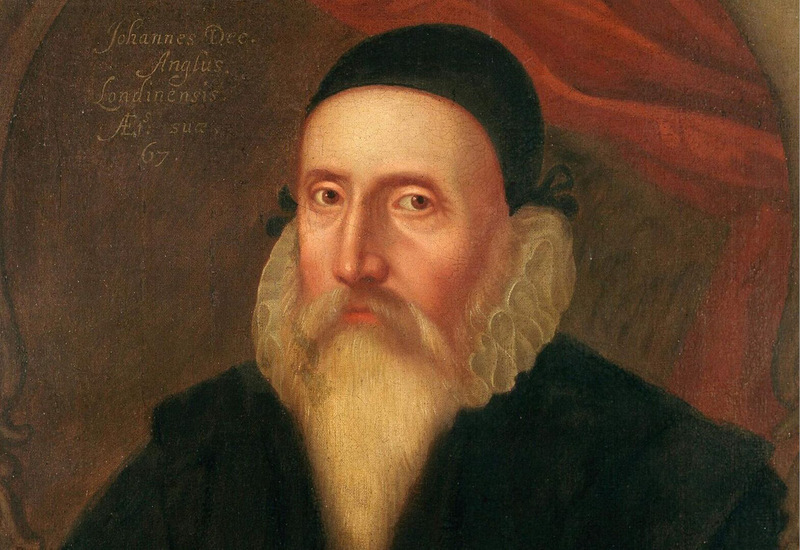
What about the Russian Middle Ages? Could we say that there wasn't one in Rus?
Of course there were Middle Ages in the lands of Rus. It's hard to argue with this thesis as there were links with all the medieval states of those times. Maybe the chronology began a little later. We say the Middle Ages started in the 5th century, but in Rus, that's a little tricky as there was no Rus to speak of at that time. Something more or less centralised only arose by the 10th century and that was more an association of semi-independent and endlessly inter-warring city-states. However, where did this not occur? Italy as a unified state only arose closer to the 19th and 20th centuries; it was also made up of a mosaic of rival city-states such as Genoa, Venice, Florence and Rome. The Holy Roman Empire was a conglomerate of several hundred small independent states. It was the same in Rus, whether the original Kyivan Rus or the later Muscovy. We see roughly the same historical processes which were simply somewhat delayed. In the early stages, culturally the influence of neighbours was more important, especially Byzantium. So there was a medieval period in Rus, even though it was slightly delayed. There was the plague and old believers and sorcerers were burnt at the stake. Executions took place at Lobnoye Mesto on Red Square.
I’ll tell you an interesting episode from my studies about Ivan the Terrible. He's held to be a symbol of the Russian Middle Ages; a tyrant tsar who did terrible things. It's believed that he had neurosyphilis and he was being treated with mercury, which only exacerbated his state. He had health advisors brought in from England. At the time, leaders feared poisoning and sought all possible means to avoid it. One of these methods was the possession of a ‘unicorn horn’; narwhal horns were used to imitate them. Ivan the Terrible acquired a staff of unicorn horn at great cost and hoped to be healed with its help. He also acquired various precious and not-so-precious stones which were believed to protect from poisoning. He had a fantastic assistant, Eliseus Bomelius, an English specialist in poisons and how to protect from them who ended up being burned at the stake because Ivan the Terrible thought he had betrayed him. This tradition of bringing in scholars from England persisted in the reigns of other tsars. The ties with England were quite strong, for instance, the port of Arkhangelsk connected the two countries. The most famous English Alchemist, John Dee, was also invited to Russia but he turned down the offer and sent his son Arthur instead, who was called Artemy Ivanovich Dee in Rus. In Moscow, he lived at the court of Michael I for more than ten years. Despite a lack of enthusiasm, he had to fulfil the role of physician to the tsar. In some ways, he brought the art of alchemy to Russia.
Magic was also practised in Rus. Almanacs of the 16th and 17th centuries describing various techniques are not very different from European ones. Even if we consider icons, which are considered a distinctive tradition not found anywhere else in the world, we can see a Western influence, since many ecclesiastical academies of those times were found not far from the borders of today's Poland and Western traditions permeated from there. In many icons of the late Middle Ages, we see subjects taken from Italian churches or strange mystical allegories taken from printed German books. Cross Cultural fertilisation was quite widespread and the degree of inter-regional cooperation in the Middle Ages was more robust than is commonly thought.
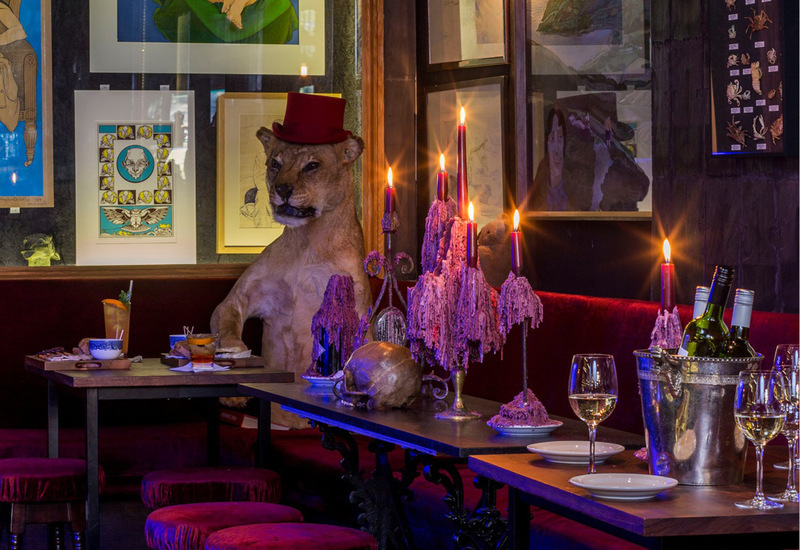
What places in London and Britain are richest in symbolism and mysticism?
I would say you have to start with the Last Tuesday Society. It's an absinth bar which contains the Viktor Wynd Museum, he’s an eccentric who has all kinds of curiosities, including some directly related to magic, both from the Middle Ages and modern times. Everybody has probably already been there but I believe a visit is a must. The British Museum has quite a good collection of magical objects. There are real magic mirrors, bells and altars used by John Dee, that very same alchemist of the Elizabethan age, to summon angels and other things. They can be seen on the ground floor of the British Museum, in those authentic old halls left over from the building’s original structure. Naturally, there are many other places associated with various modern traditions of magic beyond the medieval context. The creators of entire schools of magic performed in the oldest esoteric book shops such as Watkins Books and Atlantis. Since the 1980s, there has been an underground occult scene in Britain, concentrated of course in London, where concerts of legendary groups in the spirit of Coil and Psychic TV were held. Memorials to them can be found here.
If we move the focus away from London then a characteristic feature of Britain is the glens, mystical nooks of wild nature usually surrounded by hills or mountains, hidden in thick forest or strung along streams and rivers. It's an unusual toponym which can be defined simply as a beautiful place, but with a particular magical beauty as if the fairies lived there. There's no similar concept in Russian, for instance, we have boloto (swamp), a place where you can get stuck in the mud, and gora (mountain), a high place but we have no particular name for a place where supernatural beings live. Absolutely all the glens you find on the map are worth visiting to dive into the magical medieval atmosphere. The most significant of course are Puck’s Glen in Argyll and the Fairy Glen on the Isle of Skye. I'd like to make a separate mention of the Museum of Magic in Boscastle in Cornwall which is run by a real coven of Wiccan witches. It's a unique place with a magical atmosphere, surrounded by enchanting countryside.
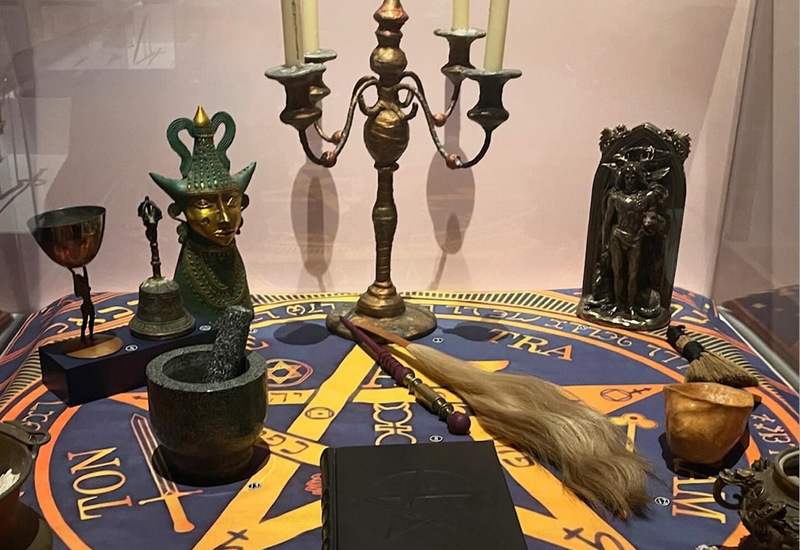
What books are works of reference for you, both literary and scientific? Does your view of literature change when you delve deep into medieval symbolism?
My view probably became more negative. I began my academic journey as a linguist. I studied German literature, looking in detail at Goethe and later Romantics who happened to research the topics of the Middle Ages and magic. This gave me an interest in old things. In Britain, this preoccupation with bygone times produced the Gothic novel, while in Germany it led to romanticism. Culture was once considered the prerogative of the aristocracy, with no place for the folklore of the common people, but in the 18th century, this quickly began to change. Educated aristocrats went on tours of the villages and learned first-hand the fairy tales of the peasants. This is how the Brothers Grimm compendium of fairy tales came about. There are similar traditions of compendia in Italy, France, England and Russia. They collected folklore, some of which was quite ancient and could be traced back to medieval traditions. As a consequence, an interest in the Middle Ages was sparked. All of this was steeped in mythological beliefs, which led to a genuine interest in magic. When Goethe wrote his Faust, he didn't just sit down and compose it, not at all, he began by studying genuine magical books. I've worked in the archives with the papers and books Goethe used to own. He asked his agents to buy up magical books all around Germany so he could study them and possibly even practice magic himself. This was very popular at the time and writers tried to base their literary works on real facts. It's another matter that if you know how things actually were in the Middle Ages and you go back to this literature an awful lot either looks wrong, naive or badly written. All the same, people's talent as storytellers is apparent in their literary reworking of the facts and not in true depictions.
Personally, I only use literary works for inspiration. You can't seriously study the Middle Ages in any aspect, whether that be magic or alchemy, by watching Game of Thrones. When we read Goethe, Shakespeare and other authors, in some sense they're also a form of Game of Thrones of their time; an attempt to popularise and depict for the masses some historical ideas in clear language. This in no way means that we should not read these wonderful works. But if you are concerned with history then they are only a start. You have to go directly to the real historical sources, which are often far more interesting.
From these literary works it's important but difficult to choose works of reference because I write more than I read. There was a time when Tolkien had a great influence on me and I think he remains a major inspiration for many today. Tolkien foresaw many things; essentially he attempted to create an epic tradition of English folklore which previously had not existed. In doing this, he wrote a defining work of our modern global culture. The subsequent films are products of mass culture which have become ubiquitous. Even if you haven’t watched The Lord of the Rings or The Hobbit, surprisingly, we all live in a world influenced by these works. For instance, in how the recent elections were presented in the press we see an attempt to devise an epic based on the mythologems Tolkien created in his books, such as dividing the world into ‘elves’ and ‘orcs’. So it seems to me his books should be works of reference for everyone since, if you try to understand them, especially at a young age, or while you're still a child or teenager, you’ll see how much modern culture is shaped by Tolkien’s ideas and that his most famous work is a sort of new Bible. What's more, his books probably inspire young people to study real history as they once inspired me.
*Rus - a name for medieval Russia originally used to describe Kyivan Rus.






